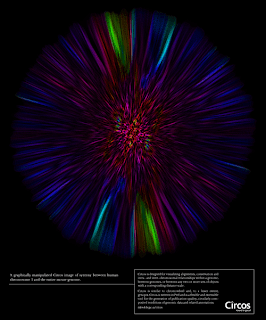VigyaanCD at
http://www.vigyaancd.org/
has a nice collection of bioinformatics software and is worth downloading. It will boot directly from the CD and needs very little linux expertise as the X-windows system is almost like windows.
Welcome to my website . This website is built up to address queries from students and upcoming professionals in the field of life sciences. Although the website projects itself as a bioinformatics portal and most of the discussion revolves around bioinfo and biotech we would like to refer as life sciences.Plz Share Ur Comments about this Blog, So that it can b customized as per ur needs...Thank u
| toolbar powered by Conduit |
Your own Bioinformatics workstation using VigyaanCD




CIRCOS - VISUALIZING THE GENOME, AMONG OTHER THINGS
Biopython is a set of freely available tools for biological computation written in Pythonby an international team of developers.
It is a distributed collaborative effort to develop Python libraries and applications which address the needs of current and future work in bioinformatics. The source code is made available under theBiopython License, which is extremely liberal and compatible with almost every license in the world.
This post will help you download and install Biopython, and start using the libraries and tools.
See also What's new.
For Windows we provide click-and-run installers (specific to your version of python), but you will first need to install some prerequisite software (listed below, in particular, NumPy).
Most Linux distributions will include an optional Biopython package (described below), and will take care of any prerequisite software automatically.
Otherwise you typically install from source by downloading and uncompressing the archive, then running the commands:
python setup.py build python setup.py test sudo python setup.py install
If you have trouble, see the full installation instructions:
If you are still stuck, sign up to the Biopython mailing list and ask for help there.
For compiling Biopython:
Some parts of Biopython use the following additional python libraries:
In addition Biopython includes wrapper code for calling a number of third party command line tools including:
We don't officially sanction this option, but it has been reported to work fine. If you haveeasy_install installed on your computer, you can download and install the latest Biopython distribution by simply executing this command:
easy_install -f http://biopython.org/DIST/ biopython
You will have to have administrator's rights to do this. On a Unix style system this is normally done by:
sudo easy_install -f http://biopython.org/DIST/ biopython
For those of you using Linux, the easiest way to install Biopython is through your distribution's package management system. However, unless you are running a recent release of your Linux Distribution, you may find that the Biopython packages available to be a little out of date. You might want to see if there is a backport available, otherwise you will have to install Biopython from source.
You should be able to install Biopython and its dependencies using the Synaptic GUI tool (on the main menu under System / Administration / Synaptic Package Manager), or at the command line using:
sudo apt-get install python-biopython
If you want the documentation and unit tests,
sudo apt-get install python-biopython-doc
And if you want to use BioSQL,
sudo apt-get install python-biopython-sql
However, this will probably not be the latest release (seeUbuntu listing here, andDebian listing here). If you want the latest version of Biopython, you will need to install it from source. However, you should be able to automatically install the build dependencies with the following command:
sudo apt-get build-dep python-biopython
Note: You may need to additionally install the NumPy package by hand, as an out of date repository may still expect Biopython to use Numeric instead.
Biopython is an official Fedora package (since Fedora 5). The package is named python-biopython, and can be installed using yum as root:
yum install python-biopython
or via one of the GUI package management systems such as pirut and PackageKit (available in F-9 and later).
Gentoo's portage tree contains an ebuild (sci-biology/biopython) which builds from source. To install it, open a terminal as root and run:
emerge -va biopython
Here is a link to Biopython atGentoo-Portage which shows the latest versions in Gentoo's Portage tree.
The most easy way of installing Biopython in FreeBSD is through the Ports Collection. If you're new to this procedure please take a look at this document. Supposing that you're familiar with this method and that you have an up-to-date ports tree, all you need to do is to execute the following commands as root:
# cd /usr/ports/biology/py-biopython # make install clean
Due to the great architecture of the ports system, this simple commands will automatically fetch and install Biopython (as well as its necessary dependencies).
Recent releases of Biopython require NumPy (and not Numeric):
Please note that Biopython 1.48 and older require the Numeric library, not its replacement NumPy. Windows installers for Python 2.4 and older are available from the Numerical Pythonwebsite. A Windows installer for Numeric 24.2 for Python 2.5 is available here:Numeric-24.2.win32-py2.5.exe446 Kb
Please note that Biopython 1.48 and older used mxTextTools 2.0 in some of the parsers. There were a few niggles with mxTextTools 3.0, so ideally install the older mxTextTools 2.0.
Bio-python


BIOINFORMATICS. All Rights Reserved.